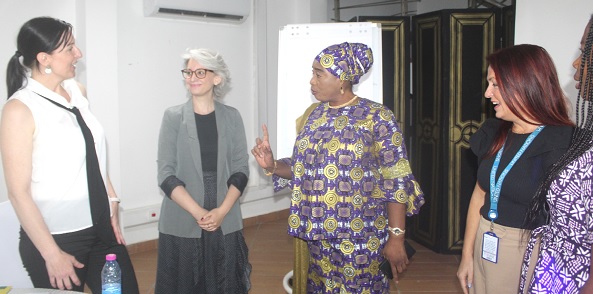
Strengthen gender responsiveness to shocks — UN Gender Expert
An International Consultant with UNICEF, Dr Maria Klara Kuss, has called for commitment and a participatory approach to strengthen gender responsiveness to shocks such as pandemics.
Advertisement
She said enough time had been devoted to talking about the issues and it was now time to act.
At a stakeholder engagement to validate the Gender and Shock Responsiveness of Ghana's Social Protection System in Accra yesterday, Dr Kuss stressed that understanding the issues and what needed to be done required a roadmap to transform the discussion into action.
"We give recommendations and expect things to work; we need to do more in order to move forward, hence the need to have a roadmap,” she explained.
Stakeholder engagement, roadmap
Stakeholders in the gender and social sector are validating the proposed roadmap and fine-tuning it to be fit for purpose.
The framework is expected to enhance the country’s social protection system and make it resilient to reduce the impact of emergencies and pandemics, among others, on the most vulnerable population, including men, women and children.
It has become necessary to have the roadmap to help mitigate the disproportional impacts of the shock situations such as the COVID-19 pandemic and economic recessions on the vulnerable, particularly women and children.
The roadmap would also address gender challenges such as gender-based violence, teenage pregnancies and child marriage, as well as the limited participation of women in political decision-making.
Participatory approach
Dr Kuss said the framework also required evidence-based approaches and the use of a comprehensive approach, grounded on solid research of what works, what did not and why they did not work.
She further noted that women in Ghana were severely disadvantaged compared to men when it came to economic opportunities.
For instance, she said, labour force participation rate among females was 65.3 per cent as against that of men which stood at 72.4 per cent in 2022, citing a 2023 report of the World Bank.
In terms of access to productive resources, among other things, Dr Kuss again referred to the Ghana Statistical Service figures which put women ownership or control over agricultural land at about 19 per cent in 2017, as compared to 33 per cent of men.
Implications
The absence of such a roadmap, therefore, had dire implications, including physical violence, sexual violence and abuse and high school dropout rates, the UNICEF international expert pointed out.
Other consequences included decreased education and employment opportunities, sexual and reproductive health problems, discrimination, stigmatisation, child and forced marriages, verbal, emotional and physical violence, among others.
Civic responsibility
The Minister of Gender, Children and Social Protection (MOGCSP), Lariba Zuweira Abudu, said gender mainstreaming in social protection was not solely an act of fulfilling obligations, but it was a civic responsibility.
"Every individual, regardless of gender, deserves equal opportunities, privileges and protection in the world in which we live.
Social protection, however, is a fundamental drive towards gender equity and equality,” she said.
Responsibilities
The minister stated that women had more domestic care responsibilities and were more likely to be inadequately compensated, which negatively impacted their lifestyles, livelihoods and infrastructure which made them more susceptible to crises and shocks.
“Recent evidence has also highlighted the vulnerability of males that requires more critical attention to ensure that the needs of different groups and classes are considered in social protection design, programming, delivery and shock response free from bias”, she said.
Consequently, the minister thanked the development partners for the continuous technical and financial assistance to the ministry to strengthen the social protection systems and help make them more gender-sensitive and shock responsive.
“Let me also thank my team, led by the Chief Director, for coordinating this work thus far.
We will work with the consultant, engage the flagship social protection programmes to refine and adjust the roadmap to ensure that it is fit for purpose,” she assured.
Writer’s email: [email protected]




